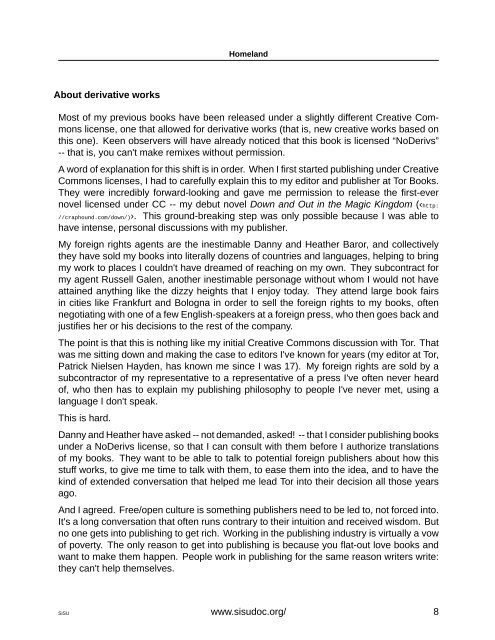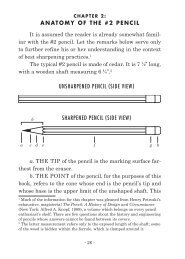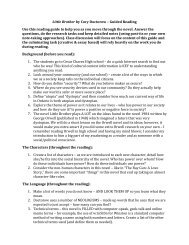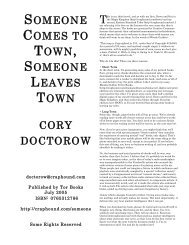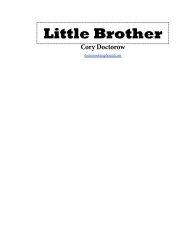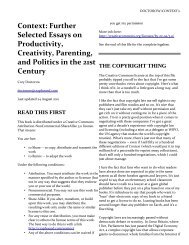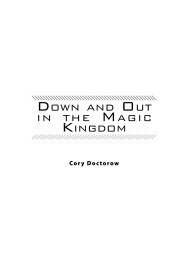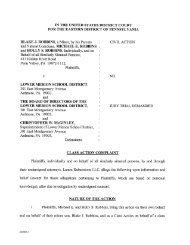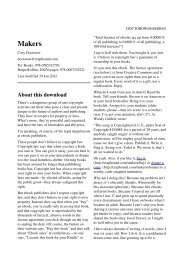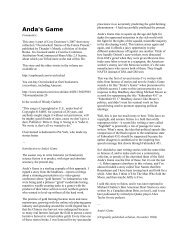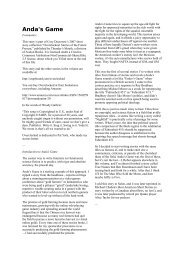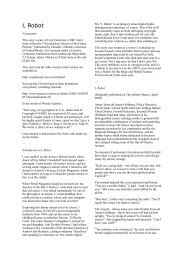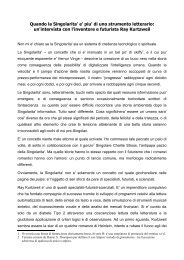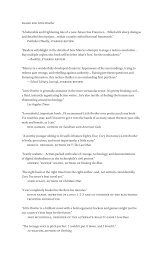- Page 1 and 2: Homeland Cory Doctorow copy @ www.s
- Page 3 and 4: Homeland, Cory Doctorow SiSU www.si
- Page 5 and 6: USA: Homeland ‹Amazon Kindle› (
- Page 7 and 8: Homeland full of oversized hardcove
- Page 9: Homeland isn't dead yet, and has su
- Page 13 and 14: Dedication For Alice and Poesy, who
- Page 15 and 16: Chapter 1. Homeland Attending Burni
- Page 17 and 18: Homeland “Where to start?” I sa
- Page 19 and 20: And almost all of it was about dead
- Page 21 and 22: And reality sucked. Homeland So I w
- Page 23 and 24: Homeland She closed her eyes and st
- Page 25 and 26: Homeland She'd smiled sadly and sai
- Page 27 and 28: on meeting me. Homeland “That's w
- Page 29 and 30: Homeland Ange giggled. “Someone's
- Page 31 and 32: Homeland “Word gets around. Lots
- Page 33 and 34: Homeland to all the people who risk
- Page 35 and 36: Chapter 3. Homeland All day long, p
- Page 37 and 38: “Come on and meet the rest.” Ho
- Page 39 and 40: Homeland didn't surprise me, but cl
- Page 41 and 42: Homeland their line and we all rush
- Page 43 and 44: Homeland A closed-door military tri
- Page 45 and 46: Homeland person I shared it with ha
- Page 47 and 48: USA: Homeland ‹Amazon Kindle› (
- Page 49 and 50: Homeland its thinnest wall on the o
- Page 51 and 52: Homeland I closed my eyes. I couldn
- Page 53 and 54: Homeland “Groagh,” I said, and
- Page 55 and 56: Homeland else (for some extremely s
- Page 57 and 58: Chapter 5. Homeland We hardly spoke
- Page 59 and 60: Homeland bag while I was repacking
- Page 61 and 62:
Homeland Internet through AT&T, a s
- Page 63 and 64:
“Yes,” I said. Homeland “The
- Page 65 and 66:
Homeland showed a handsome but seve
- Page 67 and 68:
Homeland myself growing excited. Mo
- Page 69 and 70:
Homeland “I like your taste in co
- Page 71 and 72:
Homeland I could see why she was th
- Page 73 and 74:
Chapter 6. Homeland I spent the res
- Page 75 and 76:
Homeland And that's when I remember
- Page 77 and 78:
Homeland I didn't have an answer fo
- Page 79 and 80:
Homeland the entire yak pen at the
- Page 81 and 82:
Homeland She crossed her eyes. “I
- Page 83 and 84:
Homeland “So all these ones, they
- Page 85 and 86:
Homeland “Jolu wouldn't turn me d
- Page 87 and 88:
Homeland I heard him snort, and I c
- Page 89 and 90:
Homeland the Internet from us, make
- Page 91 and 92:
Homeland I was almost late for work
- Page 93 and 94:
Homeland “You're welcome -- I mea
- Page 95 and 96:
Homeland bunch of captured emails a
- Page 97 and 98:
Chapter 8. Homeland Once upon a tim
- Page 99 and 100:
Homeland I put up my hands and Liam
- Page 101 and 102:
Homeland they must use them. I mean
- Page 103 and 104:
Homeland “One. Two. Ten. Eleven.
- Page 105 and 106:
Homeland The IT manager had looked
- Page 107 and 108:
Homeland and so no one much wanted
- Page 109 and 110:
Homeland table and went to the bath
- Page 111 and 112:
Chapter 9. Homeland If you ever wan
- Page 113 and 114:
Homeland As far as anyone knows, he
- Page 115 and 116:
Homeland “What do you mean? Like
- Page 117 and 118:
Homeland was talk to everyone else
- Page 119 and 120:
Homeland middle of the operating sy
- Page 121 and 122:
Homeland Unseen hands had dragged m
- Page 123 and 124:
shut up > felch me dickcheese > ur
- Page 125 and 126:
Homeland “Or what? I make one cal
- Page 127 and 128:
Homeland I've been snatched twice.
- Page 129 and 130:
Homeland No. You know what I felt l
- Page 131 and 132:
Homeland “That's very true. But i
- Page 133 and 134:
Homeland to come to light some day
- Page 135 and 136:
Homeland “I've got a lot of backu
- Page 137 and 138:
Homeland theory is that people get
- Page 139 and 140:
Homeland “Nope,” said Knothead.
- Page 141 and 142:
Homeland call to a person who was a
- Page 143 and 144:
Chapter 10. Homeland Zyz wasn't alw
- Page 145 and 146:
Homeland boss tell her to forget ab
- Page 147 and 148:
Homeland “I didn't think I had to
- Page 149 and 150:
Homeland The first words he said we
- Page 151 and 152:
Homeland a loose, floppy cotton top
- Page 153 and 154:
Homeland -- Carrie Johnstone, the w
- Page 155 and 156:
Homeland traffic in SoMa, and Darry
- Page 157 and 158:
Homeland “Good point,” Ange sai
- Page 159 and 160:
Homeland was looking sick and scare
- Page 161 and 162:
Homeland Now Jolu was shaking his h
- Page 163 and 164:
Homeland research and messaging, wh
- Page 165 and 166:
Homeland He looked a little embarra
- Page 167 and 168:
Homeland our software and keep our
- Page 169 and 170:
Homeland “I just felt like a good
- Page 171 and 172:
Homeland Zyz had its fingers in a l
- Page 173 and 174:
Homeland Not being able to sleep su
- Page 175 and 176:
Homeland “Cool,” he said, crest
- Page 177 and 178:
Homeland “And we know that any po
- Page 179 and 180:
“A darknet site is a normal websi
- Page 181 and 182:
Homeland this morning about Hearts
- Page 183 and 184:
“It's cool,” he said. “Don't
- Page 185 and 186:
Homeland didn't go back. Just befor
- Page 187 and 188:
Homeland Of course, once my laptop
- Page 189 and 190:
Homeland it's manufactured. You cho
- Page 191 and 192:
Homeland “Holy crap,” I breathe
- Page 193 and 194:
Homeland that had to happen. No mor
- Page 195 and 196:
“Hello there,” he said. “I'm
- Page 197 and 198:
Homeland I shrugged. “Probably. I
- Page 199 and 200:
Homeland My phone rang then -- it w
- Page 201 and 202:
Homeland He had the rolling tones o
- Page 203 and 204:
Homeland that the Bay Bridge was an
- Page 205 and 206:
Homeland dish and use it to kill a
- Page 207 and 208:
Homeland The silhouetted stalks of
- Page 209 and 210:
Homeland I was agog. Somehow, this
- Page 211 and 212:
Homeland “You can go now.” It b
- Page 213 and 214:
Homeland were like brainless, drift
- Page 215 and 216:
Chapter 13. Homeland He was only a
- Page 217 and 218:
Homeland foggy, steamed-up goggles.
- Page 219 and 220:
Homeland dictators, spilled their b
- Page 221 and 222:
I moved it. “Three, right?” “
- Page 223 and 224:
Homeland He lifted it up like bug s
- Page 225 and 226:
Homeland No one asked me why I was
- Page 227 and 228:
Homeland Within a few hours, the ce
- Page 229 and 230:
Chapter 14. Homeland Mom and Dad we
- Page 231 and 232:
Homeland As one, the whole office t
- Page 233 and 234:
-..- But first, I had to harden our
- Page 235 and 236:
Homeland “Now, about these docume
- Page 237 and 238:
Homeland But this was here. This wa
- Page 239 and 240:
Homeland My new phone rang at 2 A.M
- Page 241 and 242:
Homeland her research into antidepr
- Page 243 and 244:
Homeland “Marcus,” Jolu said,
- Page 245 and 246:
Homeland “Argh. Okay, well, for w
- Page 247 and 248:
Homeland first fallback cloud provi
- Page 249 and 250:
Homeland He shook his head once, mi
- Page 251 and 252:
Homeland And then, well, the good a
- Page 253 and 254:
“Yeah?” Homeland “You're some
- Page 255 and 256:
Homeland I shrugged again. “Proba
- Page 257 and 258:
Homeland After all, wasn't the syst
- Page 259 and 260:
Homeland clean up my mess. And I sa
- Page 261 and 262:
Homeland out, you need to work it o
- Page 263 and 264:
Homeland ‹Politics and Prose: 501
- Page 265 and 266:
Homeland “Hi, Ange,” I said, le
- Page 267 and 268:
Homeland eyes, three brains, three
- Page 269 and 270:
Homeland Afterword by Jacob Appelba
- Page 271 and 272:
Homeland need to be preserved in th
- Page 273 and 274:
Homeland donated to the president's
- Page 275 and 276:
Bibliography Homeland When I was a
- Page 277 and 278:
Homeland There's plenty more -- mor
- Page 279 and 280:
Homeland ‹Apple iBooks› (DRM-fr
- Page 281 and 282:
Homeland can be identified, the pub
- Page 283 and 284:
Homeland monetary compensation, pro
- Page 285 and 286:
Homeland v. Each time You Distribut
- Page 287:
Metadata SiSU Metadata, document in


